Wednesday, April 25th, 2012
By Carolyn Yeager
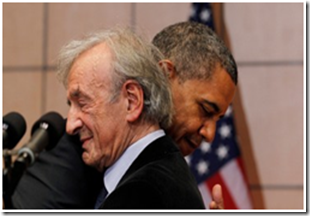 Do we have a stupid President, or what?
Do we have a stupid President, or what?
On Monday, April 23, U.S. President Barack Obama toured the U.S. Holocaust Memorial Museum with Elie Wiesel as his guide. Following the tour, both Wiesel and Obama gave boring, highly hypocritical speeches to the assembled diplomats, Jews, Shoah survivors, supporters and workers. Both speeches together lasted about 35 minutes. (Pictured right, Wiesel and Obama hug between speeches)
During Obama’s talk, he recalled a previous time that Elie had guided him through one of the Shoah’s sacred shrines–Buchenwald, in June 2009. At the 11:10 mark of this video, Obama remembers:
We stopped at an old photo, men and women lying in their bunks, barely more than skeletons, and if you look closely you can see a sixteen year old boy, looking right at the camera, right into your eyes … you can see Elie.
President Obama was talking about this old photo, which is a cropped version of the original.
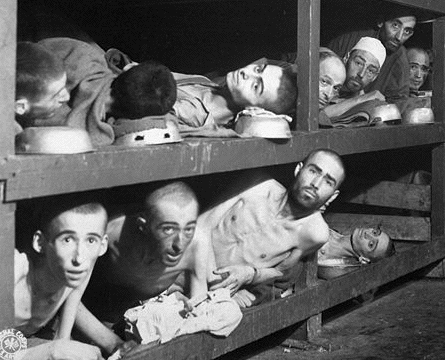 This photograph was taken on April 16, 1945 when Elie Wiesel could not have been in it because he was in the hospital at Buchenwald deathly ill from food poisoning, according to both Night and his memoir All Rivers Run to the Sea.
This photograph was taken on April 16, 1945 when Elie Wiesel could not have been in it because he was in the hospital at Buchenwald deathly ill from food poisoning, according to both Night and his memoir All Rivers Run to the Sea.
Obama made a big boo-boo in saying “men and women” were in the photo, lying in bunks together. But we already questioned his intelligence, so we’ll pass that by. The bigger mistake he made was identifying the face in the far upper right as Elie Wiesel. His presidential aides should familiarize themselves with this blog before their boss’ next meeting with the Holo idol. This site has proven that it is not Elie Wiesel in that picture, especially here and here.
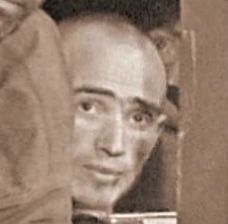 Judge for yourself from this cleaned up, unretouched enlargement of the round-headed man (right), found to be in his 30’s by a computer program designed by Apple. Or check out Computer program judges “Elie Wiesel in Buchenwald” to be 30-36 years of age once again.
Judge for yourself from this cleaned up, unretouched enlargement of the round-headed man (right), found to be in his 30’s by a computer program designed by Apple. Or check out Computer program judges “Elie Wiesel in Buchenwald” to be 30-36 years of age once again.
Compare this face to a real 16 year-old—Nikolaus Grüner in the far lower left of the picture above.
This tells us that President Obama doesn’t think for himself, but accepts whatever he is told by members of the Jewish race, like Elie Wiesel. But we already knew that. Elie says, “That’s me,” and Barack says, “My, so it is.”
Obama continues recalling the Buchenwald meeting:
And at the end of our visit that day, Elie spoke of his father. “I thought one day I would come back and speak to him,” he said “of times of which memory has become a sacred duty of all people of good will. ” Elie, you’ve devoted your life to upholding that sacred duty. You’ve challenged us all as individuals and as nations to do the same with the power of your example, the eloquence of your words … as you did again just now … and so to you and Marion we are extraordinarily grateful.
First, who is we? The entire U.S. citizenry? I’m sure there are many who, like me, opt out of that sentiment and are not grateful to Elie Wiesel. Think how Wiesel uses the word “memory” here. “Memory should become a “sacred duty of all people,” is what he is saying. How can “memory” alone be a sacred duty? But he is meaning a specific memory of the Jewish Holocaust, nothing else. He doesn’t want to say that out loud for all us non-Jews to hear, but we’re supposed to pick it up anyway. We know he means only the memory of the Jewish “holocaust” because he supports the Holocaust Lobby’s condemnation of the Germans’ right to their memories, doesn’t he? If any nation’s memories conflict with the sacred Shoah narrative, they should be suppressed, even criminalized. Wiesel said as much in his speech. In the case of Germany, their non-shoah-approved memories are criminalized (see here). It is the same in Austria and to a lesser degree in many European countries, and Wiesel is on record for favoring criminalization in the United States! Barack Obama is promising that “as a nation” we will follow Elie Wiesel’s example.
You should also be aware that the Shoah narrative is still in flux, still changing, so we don’t even know what we’re in for.
Barack Obama, representing the American people, is committing a great injustice to most of us in order to beg for the Jewish vote. How far will we allow the Jewish takeover of America to go?
UPDATE: April 26, 8 p.m.
A perfect example of the hypocrisy of Wiesel’s “sacred duty of memory” was offered today in a news story from Europe. The U.S. State Department’s “special envoy to fight global antisemitism” Hanna Rosenthal was touring Latvia after meeting earlier with the mayor of Malmo, Sweden. In Latvia, she pressed the Latvian leadership on their country’s continued commemorations of Latvian participation in the Waffen SS, the military wing of the National Socialist party, which included volunteer divisions from all over Europe. Many Latvians consider the volunteers who fought against the Soviets to be heroes of the nation. To Rosenthal’s objections that this amounted to condoning the killing of Jews, they said their history is “complicated” and they don’t see it in simple right/wrong terms. But Rosenthal insisted, with the weight and power of the United States government behind her, that such a commemoration was “offensive to Jews.” Because it is offensive to Jews, the Latvians’ sacred duty to their memory of resisting the takeover by the Soviet Union cannot be allowed.
What could show more clearly that it is indeed only the memories sacred to the Jews that all the world is expected to honor. Our own sacred memories, whatever they may be, must come second to theirs. Who in their right mind accepts such rules?
8 Comments
Category Featured | Tags: Tags: Barack Obama, Buchenwald, Elie Wiesel, USHMM,
Social Networks: Facebook, Twitter, Google Bookmarks, del.icio.us, StumbleUpon, Digg, Reddit, Posterous.
Wednesday, September 28th, 2011
With Commentary by Carolyn Yeager
This Q & A was presented in the Post and Courier newspaper on September 18 as a question & answer session in connection with Elie Wiesel’s speech at the College of Charleston (South Carolina) on Sunday, Sept. 25.
I have added some comments and questions that I would have liked to ask Mr. Wiesel had I been allowed to be present. Of course, this was a very controlled event, if it were not, in fact, private, one week before the speech. The main interest here is how Wiesel skirts around all questions and gives the same pat answers that he has been giving for years. He has rehearsed what he will say and does not go beyond his rehearsed answers; thus his answers never change and often strike an aberrant note, as if not directly relating to the question. ~cy
The first picture accompanying this news story is the famous one that is permanently associated with Wiesel wherever he goes.
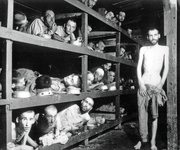
The caption tells us that Wiesel is in the picture, but we, the followers of this blog, know that he is not and that a Gigantic Fraud has been carried out concerning this picture, by powerful forces such as the New York Times, and by Wiesel himself.
Q: In your book “Night,” you describe the ardent faith you practiced as a child and address the dilemma of a compassionate God, making it clear that because of the Holocaust and what you witnessed during your ordeal, you became a skeptic. Are you still asking questions? What is the nature of your faith or nonfaith today?
A: First question, yes, I continue asking questions. I belong to the Talmud tradition. The Talmudic tradition actually emphasizes the question, much more than the answer. Answers come and go, the questions are eternal. When it comes to the question of faith, of course, … profound or painful. So what I say to myself is, “Of course I believe in God.” I believe in God because my father and my grandfather and his and so forth, they all believed, and (down) the line — I hope I’m not the last. … But my faith is a wounded faith.
Comment: Wiesel is proud to be Talmudic. In his tradition, answers are not expected. Perhaps answers are not even missed, for Talmudic Jews take pride and pleasure in endlessly discussing what is God among themselves. They determine God; it is not God who informs them. Wiesel says he continues to profess belief in God because he wants to honor his ancestors. It is a Jewish tradition.
Q: And what about the concept of justice? Is it possible to reconcile it with the abomination that was the Holocaust?
A: To me, this is the question of all questions. On many levels, I don’t understand God, which I cannot. We have a very, very great sage called Rabbi Eliezer HaKalir. He was a great, great thinker and a poet, too. And he said, “If I knew God I would be God.” So nothing concerning, really, the definitive God, the Almighty, Just, the King of the Universe is a question. I don’t know how it’s possible He knew and yet he is silent. So the silence of God troubles me. But it doesn’t stop there. The silence of the world’s leaders also troubles me.
Comment: The King of the Universe, says Wiesel, is silent about the Holocaust. Could it be because it is untrue and their God doesn’t or can’t acknowledge what is false and has no reality? In any case, Wiesel would rather focus on the world and its leadership.
Q: There’s sacred justice, but there’s also human justice.
A: Yes. Human justice. Exactly.
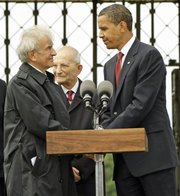
The next picture shows President Barack Obama shaking hands with Elie Wiesel, who specifically invited the U.S. president to visit the former Buchenwald camp during his trip to Germany in June 2009. Wiesel has great influence as the most famous survior of Buchenwald … but wait! He wasn’t at Buchenwald. There are no records of his being there and he is not in the famous photograph above. What kind of trick is being played on the unsuspecting President Obama?
Q. And what about that? Humans are so fallible, as we know, and their justice is imperfect. Do you still think that (human) justice could ever match the depth of the injustice of the Holocaust itself?
A: It comes to define justice. Justice with a capital J — absolute justice — is one question. But the justice which has, — how to say? — betrayed, perverted human beings, that’s another question.
Comment: This answer doesn’t answer anything. Instead, it repeats the question–a typical Wieselian response.
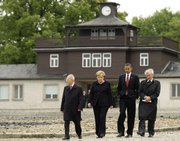
Another iconic photo chosen for this story is this one also taken at Buchenwald in 2009. It shows Obama and German Chancellor Angela Merkel walking with Wiesel (on the right), who is “showing them around.” I believe this is his very first visit there. But then, that’s no doubt true for all of them.
Q: Has life for you continued to be a long “night”? If so, what has kept you going? What, if anything, gives you joy?
A: Joy. … I see children, I have joy. I have my grandchildren, I have joy. On the other hand, I remember that we lost almost 2 million children. So the joy is not a perfect joy anymore.
Comment: Apart from the fact that 2 million children were not lost, Wiesel is a millionaire, lives in one of the highest priced locations in the world, is listened to by rulers, presidents and celebrities; has hundreds of people to do his bidding. The public treats him with reverence. His beloved State of Israel has become a great power. But I guess we’re to believe he is really suffering.
Q: Has there been any change, any little glimmer of light that managed to penetrate the “night”?
A: The answer is yes, it must be. It must. I think it was (Albert) Camus who said when there is no happiness, you must create happiness. That goes for joy, that goes for peace, that goes for all the good things in life. To say that night has vanished, no, it’s not, it’s still there. But paradoxically, other things came afterwards, and they, too, are as real. In other words, I would still say night is long and infinite, but I’m not alone in this world.
Comment: Time for the violins to start playing in the background.
Q: And in a way, perhaps, your writing itself, all the books, has helped to create some semblance of happiness for you?
A: Only if other people are happy and feel victorious over sadness. My happiness must be a result of theirs.
Comment:The violins are still playing.
Q: The Holocaust surely was an aberration, an example of Fascism run amok. But Fascism has a tendency to run amok, as you repeatedly have pointed out. You have condemned genocides and reminded the world that it must remain vigilant. How do you categorize the Holocaust? Was it unique in its nature, or only its scale?
A: No, I think it was unique; therefore, it must remain unique in memory. Once you say that it’s not, it opens history again to other mass murder. History has proven that it can and, therefore, it may continue.
Comment: Take notice! Wiesel is making it clear: the Jewish Holocaust was unique! His reasoning (?) is that if it were not, new genocides can happen. The Holocaust, by being unique, closes history to more mass murder. (This is perilously close to saying the Jews died so that others would not — an aspect of their hidden agenda to replace Christ with The Jew.) But he follows by saying it can, and may, continue. As he said at the beginning, there are no answers … not from God and not from him.
Q: You have long been a supporter of Israel, and were once invited to consider public office there.
A: (Laughing) I was offered to be a president. I was under pressure in the first few weeks, and, you know how it is, the more I said no, the harsher the pressure grew.
Comment: He has a close relationship to all top Israeli politicians, from at least 1950 on.
Q: So what made you decide to stay in the United States?
A: I came here in 1956. I came as a stateless person. Can you imagine? You cannot, because you were born here probably. … And here I came, I was accepted by the United States as an American citizen. And I had my passport all the time with me because I never had another passport in my life. So I owe this country quite a lot. I love this country.
Comment: This is an insincere answer. He could have become a citizen in any state, certainly in France even when he was underage. He didn’t want to. He wanted to be in the most powerful country, the one the Jews of Israel planned to control. This is why he came to the U.S. and devoted himself to projects like bringing into existence the United States Holocaust Memorial Museum, a huge victory for Jews.
Q: Do you ever worry about the ways in which the Holocaust has defined Jewish identity since the war?
A: Well, I know I read about it. Some people believe this is exaggerated — we shouldn’t do that. I don’t like to turn it into an object for discussion. … What every person does or thinks with regards to (an event), I don’t want to put myself in their soul-searching. I think memory is what defines a human being and society. If you betray memory, you betray yourself and all those who believe in it.
Comment: He doesn’t answer the question. In truth, the ‘Holocaust’ has defined not just Jewish, but Anglo-American and European identity in ever-increasing strength since 1945. It is non-Jews who should be very worried about how the Big H has defined our identity, which is why Wiesel avoids the subject.
Q: When it comes to Jewish identity, how important is Israel? And what do you think should be done to resolve the conflict there?
A: I’m optimistic. … My foundation has created many things. My foundation is the one that brought together the prime minister of Israel (Ehud Olmert) and (Palestinian Authority) President (Mahmoud) Abbas. (Note: The historic first meeting of Olmert and Abbas took place at the Elie Wiesel Foundation’s second annual Conference of Nobel Laureates in Petra, Jordan, on June 22, 2006.) For the first time, they met under our auspices, and they met, they fell into each other’s arms with tears in their eyes. I turned to my wife, I said, “Look.” This is the best event that I witnessed in many, many years. Which means it can be done, therefore, it will be done, my feeling is within a year or two.
Comment: How evasive is that? He brings up something that occurred in 2006 – 5 years ago! This is more avoidance of facing the real crisis that Jewish Israel has brought about by its constant theft in the name of establishing an ‘identity’ for itself.
25 Comments
Category Featured | Tags: Tags: Angela Merkel, Barack Obama, College of Charleston, Elie Wiesel, Holocaust, Jewish identity, Post and Courier, Talmud,
Social Networks: Facebook, Twitter, Google Bookmarks, del.icio.us, StumbleUpon, Digg, Reddit, Posterous.
Wednesday, May 11th, 2011
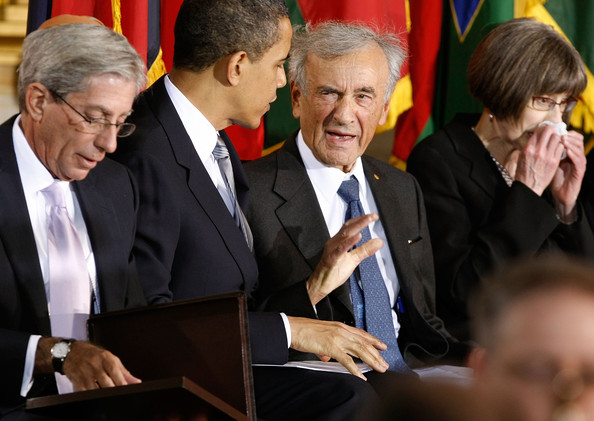
Above: U.S. President Barack Obama with U.S. Holocaust Memorial Council Chairman Fred Zeidman (L), Elie Wiesel (2nd from R) and Holocaust Memorial Museum Director Sara Bloomfield (R) at the “Holocaust Days Of Remembrance” ceremony in the Rotunda of the U.S. Capitol April 23, 2009 in Washington, DC. Established in 1993, the Days of Remembrance are commemorated in April so that they coincide with the observance in Israel. (Photo by Chip Somodevilla/Getty Images)
By Carolyn Yeager
It has just been announced that Elie Wiesel will be the recipient of the FIRST U.S. Holocaust Memorial Museum Award. Not a surprise. Wiesel is the one upon whom the “Holocaust Industry” feels safe in heaping praise, therefore he has enough “distinguished service” type awards to wallpaper a room.
What has he done to actually deserve them? He has been in the service of the outlaw state of Israel for most of his long life, condoning the dispossession of the native Palestinian people, and even their destruction by napalm bombing and massacres carried out on a regular basis. He’s not really a very good liar, although a prolific one, and so his self-created life story is not convincing to a mind that has even a little bit of critical capacity.
If we search earnestly for what this man has actually accomplished, we find a mixture of self-promotion and Holocaust “memory” promotion. In other words, Wiesel is a promoter. He’s made his name synonomous with The Holocaust. Of course, he’s been helped in this by powerful organizations, not least of which is the New York Times Corporation. That is a story that is yet to be told on this website, but it has been well-explored by Prof. David O’Connell in his article “Elie Wiesel and the Catholics.”
Wiesel’s so-called “humanitarian work” has been directed almost exclusively to help Jews and Jewish causes. He makes statements now and then about other groups, such as Africans in Darfur, but mostly ignores all those who are currently in distress in the world today in favor of receiving large sums of money to speak about the Jewish past. He will be doing the same when he receives the award from the USHMM on May 16 – an award that may very well have a sum of money attached to it. Money, by the way, that will be coming from the pockets of U.S. taxpayers!
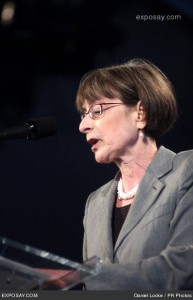 Instead of celebrating this whole hypocritical affair, we should be sickened by it. According to USHMM director Sara Bloomfield, right, (see Bradley Smith’s youtube conversation with Sara), who will present the award, “no one else has done so much (as Wiesel) to honor the victims of the Holocaust by working tirelessly to create a more just world in their memory.” Hmmm. Once again, a more just world for Jews. She explains he does this by his “conviction that the Museum should be a ‘living’ memorial.” She doesn’t explain what makes it ‘living’ and don’t expect her to. These are just words that are designed to stir emotions or good feelings in the hearer, and is what they expect. By such words we are to accept that “His legacy to humanity is unique and extraordinary.” Just don’t ask questions.
Instead of celebrating this whole hypocritical affair, we should be sickened by it. According to USHMM director Sara Bloomfield, right, (see Bradley Smith’s youtube conversation with Sara), who will present the award, “no one else has done so much (as Wiesel) to honor the victims of the Holocaust by working tirelessly to create a more just world in their memory.” Hmmm. Once again, a more just world for Jews. She explains he does this by his “conviction that the Museum should be a ‘living’ memorial.” She doesn’t explain what makes it ‘living’ and don’t expect her to. These are just words that are designed to stir emotions or good feelings in the hearer, and is what they expect. By such words we are to accept that “His legacy to humanity is unique and extraordinary.” Just don’t ask questions.
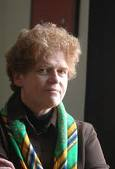 Those lucky enough to attend this dinner will also be able to hear Deborah Lipstadt, left, who will give a speech to promote her new book The Eichmann Trial. In fact, this year of 2011 was picked for the first award because it is the 65th anniversary of the verdicts at the first Nuremberg trial and the 50th anniversary of the trial of Adolf Eichmann. They can’t let “memory” die out, you know. And there is also that need to mark anniversaries of the most sacred dates in the Holocaust religious calendar.
Those lucky enough to attend this dinner will also be able to hear Deborah Lipstadt, left, who will give a speech to promote her new book The Eichmann Trial. In fact, this year of 2011 was picked for the first award because it is the 65th anniversary of the verdicts at the first Nuremberg trial and the 50th anniversary of the trial of Adolf Eichmann. They can’t let “memory” die out, you know. And there is also that need to mark anniversaries of the most sacred dates in the Holocaust religious calendar.
P.S. A postscript to Seven-up: Here is your chance to leaflet a Wiesel event in person. Hop on a plane and get yourself to the Wardman Park Marriott Hotel in Wash. D.C. by May 16th and you’ve got it made. Remember, you can download leaflets questioning Wiesel’s tattoo by clicking on the Downloads button on our menu bar—if you don’t have any leaflets of your own. Good luck and let us know how it went.
9 Comments
Category Featured | Tags: Tags: Barack Obama, Deborah Lipstadt, Elie Wiesel, Sara Bloomfield, United States Holocaust Memorial Museum,
Social Networks: Facebook, Twitter, Google Bookmarks, del.icio.us, StumbleUpon, Digg, Reddit, Posterous.
 Do we have a stupid President, or what?
Do we have a stupid President, or what? This photograph was taken on April 16, 1945 when Elie Wiesel could not have been in it because he was in the hospital at Buchenwald deathly ill from food poisoning, according to both Night and his memoir All Rivers Run to the Sea.
This photograph was taken on April 16, 1945 when Elie Wiesel could not have been in it because he was in the hospital at Buchenwald deathly ill from food poisoning, according to both Night and his memoir All Rivers Run to the Sea. Judge for yourself from this cleaned up, unretouched enlargement of the round-headed man (right), found to be in his 30’s by a computer program designed by Apple. Or check out Computer program judges “Elie Wiesel in Buchenwald” to be 30-36 years of age once again.
Judge for yourself from this cleaned up, unretouched enlargement of the round-headed man (right), found to be in his 30’s by a computer program designed by Apple. Or check out Computer program judges “Elie Wiesel in Buchenwald” to be 30-36 years of age once again.






